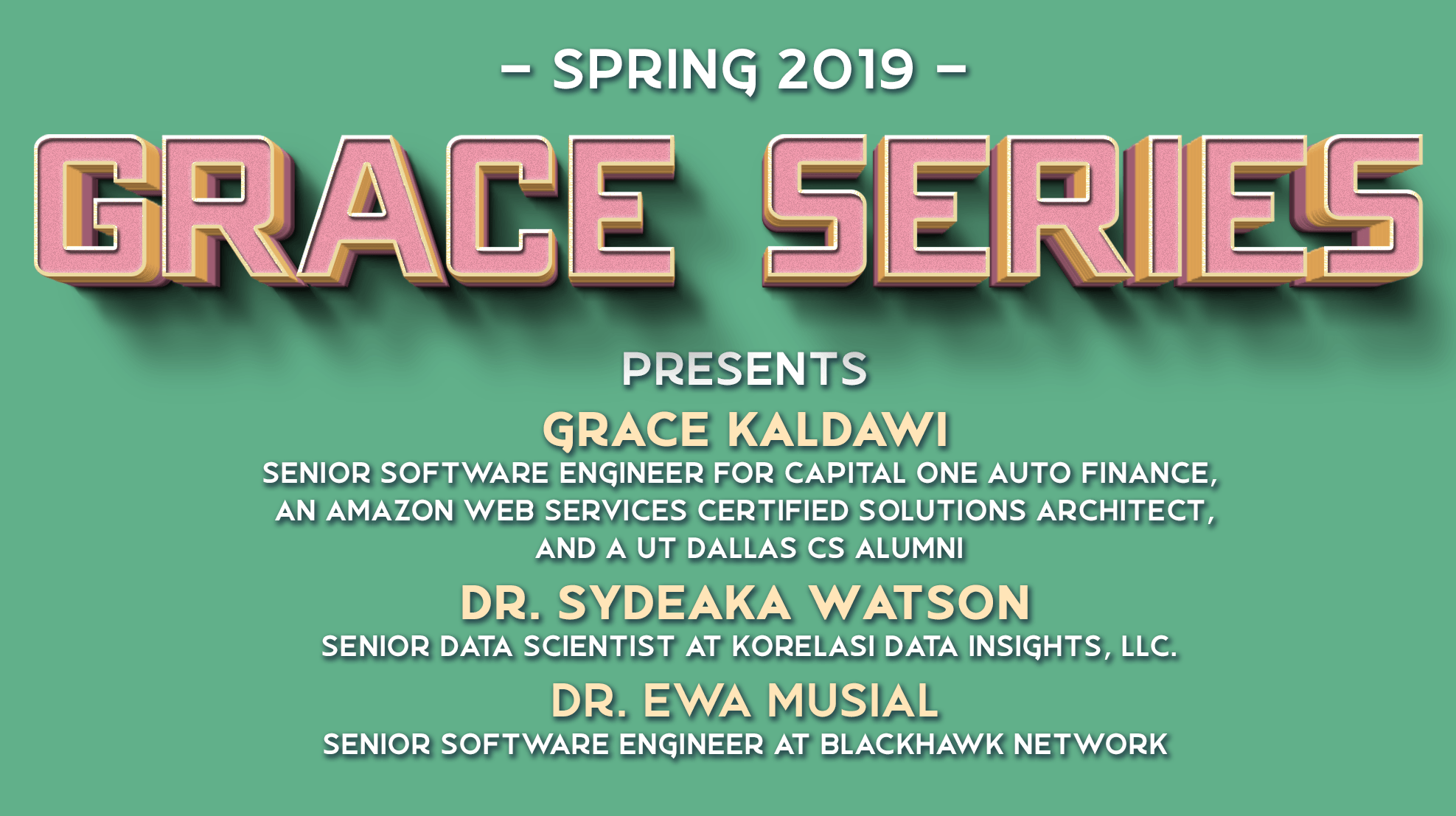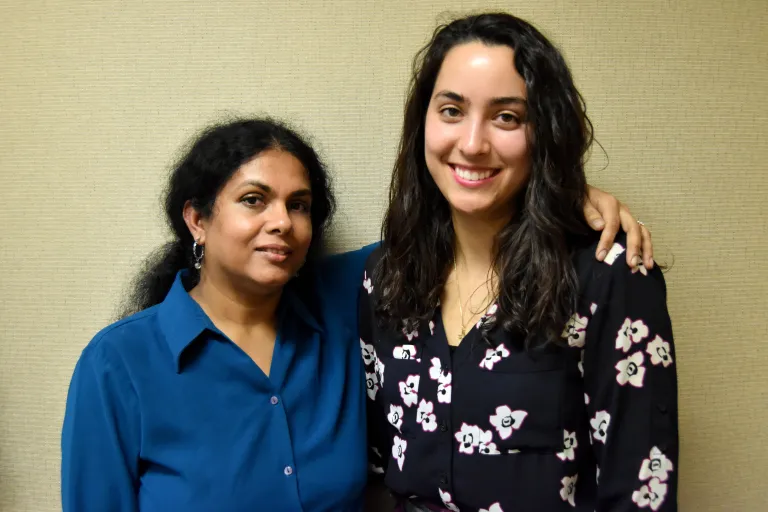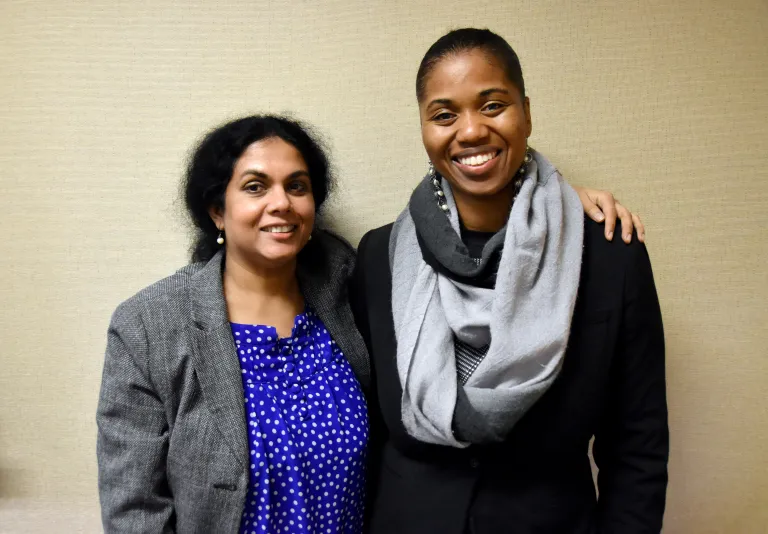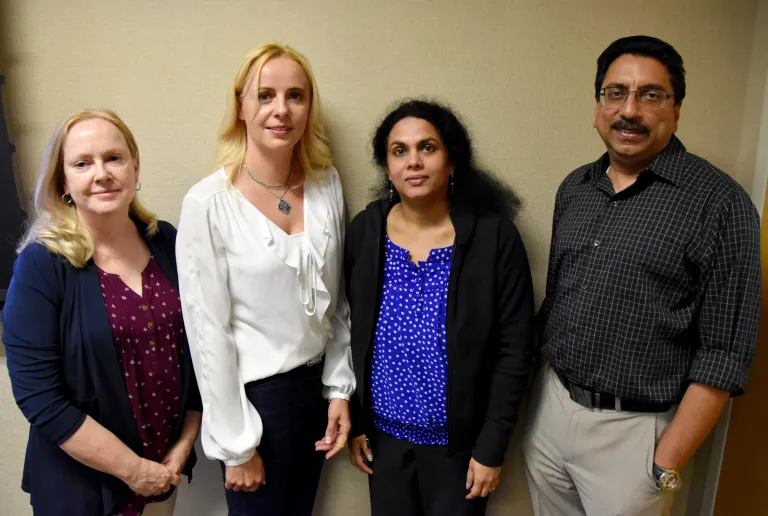Grace Series Talks Continue to Inspire through Empowering Talks by Leading Women in Tech

Whether in an office, lab, or a classroom, the accomplishments of women over the past 100 years — from scientific breakthroughs to personal triumphs — have led the way for others to follow and create their own journeys. This semester, the Spring 2019 UT Dallas Grace Series Talks featured three inspiring female members of the tech community, Grace Kaldawi, a Senior Software Engineer for Capital One Auto Finance, an Amazon Web Services Certified Solutions Architect, and a UT Dallas CS alumni, Dr. Sydeaka Watson, a Senior Data Scientist at Korelasi Data Insights, LLC, an independent analytics consulting company, and Dr. Ewa Musial, a Senior Software Engineer at Blackhawk Network. All three speakers talks attracted a full room of eager UT Dallas CS/SE students who wished to learn more about their journeys as leaders and technologists who advocate for women in STEM. This semester’s Grace Series talks showcased discussions on self-determination, goals, and journeys of women in tech.
The Grace Series Talks at UT Dallas generally feature a wide range of speakers including UT Dallas Computer Science and Software Engineering alumni, UT Dallas CS/SE professors, as well as other distinguished female and male technologists in the field. Drs. Pushpa Kumar, Janell Straach, and Linda Morales conceived the idea of the UT Dallas Grace Series as a result of attending the Grace Hopper Celebration of Women in Computing (GHC) Conference several years ago. The conference, fittingly named after the woman who helped pioneer computer programming, Rear Admiral Dr. Grace Murray Hopper, involves presentations designed to bring research and career interests of women in computing to the forefront. Every year, GHC brings together the community of female and male technologists, highlighting the best minds in computing and spotlighting the contributions of women to computing. The UT Dallas Computer Science Grace Series lectures are fashioned after the GHC Conference format.

The Spring 2019 Grace Series began with Grace Kaldawi, who delivered her talk titled, “Do’s and Don’ts of Eradicating Your Free Time.” Her talk showcased her journey as a CS student and early career professional as she continues to discover the art of saying no and the importance of giving time back to yourself. She shared with the students her own learnings gained by experience and advised students that priorities change throughout one’s journey as a student and a young professional and that it is essential to push yourself outside of your boundaries because you will learn a lot and gain more out of life. During her time studying at UT Dallas, Kaldawi went outside her normal boundaries by joining clubs, attending events, and taking on internships. She served as the president of UT Dallas student chapter of the ACM prior to founding and leading Women Who Compute. Kaldawi was a recipient of the Grace Hopper Conference Scholarship which she attended twice as a student in addition to attending the Society of Women Engineers National Conference and HackDFW. She advised students to fuel their passions outside of school by attending events such as hackathons where you are challenged to build and create something of your own design. When asked how she manages her priorities and goals, she advised students to make lists for different parts of your life as well as to set realistic goals by starting with small goals and working towards bigger ones.
Grace Kaldawi grew up in North Dallas where she was homeschooled and attended community college dual-credit classes through high school prior to starting at UT Dallas in Fall of 2010 as a Computer Science Freshman where she was awarded the Academic Excellence Scholarship. Grace graduated from UT Dallas in 2014 with a Bachelor’s in Computer Science, Summa Cum Laude and in 2015 with a Master’s in Software Engineering. After graduation Grace has remained active in the Dallas community by serving as Director of Technology for the Dallas chapter of Young Catholic Professionals, Professional Counselor to the UT Dallas SWE collegiate chapter, and as a part of the UT Dallas Computer Science Alumni Leadership team. Grace held internships at Fujitsu Network Communications, Texas Instruments, and JP Morgan Chase and is currently a Senior Software Engineer for Capital One Auto Finance where she has become an Amazon Web Services Certified Solutions Architect. Grace is also a PADI certified scuba diver and participates in local sailing regattas and weightlifting competitions.
Kaldawi also shared her role models responsible for influencing and inspiring her path. During this part of her talk, Kaldawi expressed the importance of having a role model saying, “everyone needs someone to be their champion.” She went on to speak about her personal role models, which included her own mother, UT Dallas CS professors Drs. Linda Morales, Pushpa Kumar, Janell Straach, and Rym Wenkstern, as well as Lillian Evelyn Moller Gilbreth, an American psychologist, industrial engineer, consultant, and educator who was an early pioneer in applying psychology to time-and-motion studies. Kildawi noted that Gilbreth was also one of the first female engineers to earn a Ph.D. and is considered to be the first industrial/organizational psychologist.

The second speaker for the Spring ’19 Grace Series featured Dr. Sydeaka Watson, a Senior Data Scientist at Korelasi Data Insights, LLC, an independent analytics consulting company. In her talk titled “Self-Determination,” Dr. Watson recounted her journey as a young black woman becoming a computer scientist and how self-determination got her to where she is today. She discussed the importance of not allowing others to define who you are by imposing their own limited characterizations of who you are and what you are capable of doing. She went on to say, “They might say we aren’t good enough, smart enough, loud enough, quiet enough, or (insert your favorite negative characteristic here) enough to reach our highest potential. When we allow these lies to become our truths, we underestimate ourselves, allowing doubt to steer us away from opportunities that could challenge us to soar. It’s up to us to re-write the narrative that defines who we are and the power that lies within us.” She also stressed the importance of finding a mentor and even becoming a mentor. Dr. Watson volunteers in the Dallas chapters of Girls Who Code and Black Girls Code. Dr. Watson was co-PI of the National Science Foundation and National Security Agency Project that works to grant awards to fund the ASA Committee on Minorities in Statistics Diversity Workshop and Mentoring Program.
Dr. Watson finished her talk by defining who she is, “The first thing is that I am human, I have all the rights of a human. I am an African American, and I am a woman. I am standing on the shoulders of people who really thought that I was worth fighting for. There was a time when I was not thought of as human or someone who shouldn’t be a professor or should be this or that. This month we are celebrating black history month, and during this, we are observing the hard work, dedication, and dreams of many strong African Americans throughout history. I believe I am a fulfillment of their hard work.” She continued saying, “I am also a leader! So if I need to go in a particular direction, I can forge my path and maybe even take some people along with me. I can also be a follower. That means if people are leading some charges that I agree with, then I can go along with that. I can also be a voice that is very powerful and can make changes in my community. I am a scientist, in particular, a data scientist, and I am a scholar who has made valuable contributions to the greater scientific community. I am also an entrepreneur and mentor. But at the end of the day, I get to take off my superhero cape and just be a daughter, aunt, sister, and be a part of a loving family that is proud of me and my accomplishments. Those are all things that make me who I am.” Finally, she challenged students to think about their definitions of themselves.
Dr. Watson earned a Ph.D. in Statistics from Baylor University and has several years of teaching experience at various colleges and universities. In her five years as Research Assistant Professor in The University of Chicago Biostatistics Laboratory, she consulted with over 110 biomedical research teams at The University of Chicago Medical Center, specializing in the experimental design of clinical research studies and data analytics. Her current research projects focus on artificial intelligence applications, including computer vision.

The final speaker of the Spring ’19 Grace series was Dr. Ewa Musial, a Senior Software Engineer at Blackhawk Network. Dr. Musial is currently working on machine learning predictive analytics using AWS S3, Machine Learning, and Sage modules. She has been responsible for over 20 short life-cycle Java/RESTful web services projects and fraud detection processes in the last three years. Dr. Musial works on the advancement of women in technology; she serves as a board member of the Alliance of Technology of Women (DFW*ATW). She leads the Mentoring and Professional Development Committee.
In her talk titled “Key to Your Success; Things to Know Before You Graduate”, Dr. Musial provided meaningful answers to some of the questions that arise at different stages of one’s educational and professional career. Throughout her talk, Dr. Musial shared her perspective on various life changing events such as moving to a foreign country, choosing a major and a thesis advisor, applying for internships, networking, accepting/declining job offers, negotiating salaries, and advancing careers. She advised students to try new things, join CS oriented organizations, and most importantly, to always network with others. She finished her talk by informing students that they are the ones who are responsible for defining their destiny. She noted that it is crucial “to always take credit for your achievements and try to volunteer for things that will benefit yourself and others. The sky is your only limit, and instead of sitting in the corner, you should make yourself known! All you need to do is work hard and act smart, a great career and field are just waiting for you IF you are willing to invest the time and effort.”
Dr. Musial received a BS in Mathematics from the Montclair State University in 2006 and the MS and Ph.D. degrees in Computer Science from State University of New York, Albany, NY. While working towards her Ph.D., she was employed by the New York State Police Department. Between 2008 and 2013, she worked on several projects helping to provide software solutions to law enforcement officers and detectives. During the same time, she led a project sponsored by the Institute for Defense Analysis and the State University of New York. Nowadays, her research interests include machine learning, artificial intelligence, software architecture, and reliability.
Since the inception of the UT Dallas Grace Series in the spring of 2015, a total of twenty-one inspiring women and men have spoken, including:
- Dr. Bhavani Thuraisingham, Louis A. Beecherl Jr. Distinguished Professor, UT Dallas CS Professor, and Executive Director of the UT Dallas Cyber Security Research and Education Institute (CSI) (click here for her story)
- Dr. Lily Wu, UT Dallas CS Professor and Director of the Data Communication and Data Management (DCDM) Laboratory (click here for her story)
- Dr. I-Ling Yen, UT Dallas CS Professor (click here for her story)
- Dr. Ranran Feng, UT Dallas CS Professor (click here for her story)
- Dr. Sanda Harabagiu, UT Dallas CS Professor, Erik Jonsson School Research Initiation Chair, and Director of the UT Dallas Human Language Technology Research Institute (HLTRI) (click here for her story)
- Dr. Rym Zalila-Wenkstern, UT Dallas CS Professor and Director of the Multi-Agent and Visualization Systems lab (click here for her story)
- Dr. Inga H. Musselman, Vice President for Academic Affairs and Provost for The University of Texas at Dallas (click here for her story)
- Dr. Jo Zhang of Fujitsu Laboratories of America (click here to read her story),
- Dr. Farokh Bastani, UT Dallas CS Professor, Excellence in Education Chair, and Director of the UT Dallas site of the NSF Net-centric and Cloud Software and Systems Industry/University Cooperative Research Center (NSF NCSS I/UCRC) (click here to read his story)
- Dr. Peggy Shadduck, Director of both the Dallas County Community College District (DCCCD) STEM Institute and of the Dallas/North Texas STEM Degree Accelerator Program (click here to read her story)
- Lymari Ames of Cisco Systems (click here to read her story)
- Romelia Flores a IBM Distinguished Engineer and Master Inventor (click here to read her story)
- Jill Blanchar, a Bank of America Information Security Executive (click her to read her story)
- Lisa Frey, State Farm Scrum Master (click her to read her story)
- Kimberly Snipes, USAA, VP, Chief Information Officer (click her to read her story)
- Catherine Walsh, Senior Vice President and General Manager of Loss Prevention for Johnson Controls’ Tyco Retail Solutions
- Dr. Nimmi Kannankutty, Deputy Division Director in the Division of Graduate Education (DGE) at the National Science Foundation (NSF).
- Dr. Karen Mazidi, UT Dallas CS Professor (click here to view her slides from her Grace Series Talk titled “Discovering Your Strengths”)
- Grace Kaldawi, Senior Software Engineer for Capital One Auto Finance, Amazon Web Services Certified Solutions Architect, and UT Dallas CS Alumnus
- Dr. Sydeaka Watson, a Senior Data Scientist at Korelasi Data Insights, LLC, an independent analytics consulting company
- Dr. Ewa Musial, a Senior Software Engineer at Blackhawk Network
The Grace Series will continue next fall with more featured guests from both academia and industry.
ABOUT THE UT DALLAS COMPUTER SCIENCE DEPARTMENT
The UT Dallas Computer Science program is one of the largest Computer Science departments in the United States with over 2,800 bachelors-degree students, more than 1,000 master’s students, 190 Ph.D. students, 52 tenure-track faculty members, and 41 full-time senior lecturers, as of Fall 2018. With The University of Texas at Dallas’ unique history of starting as a graduate institution first, the CS Department is built on a legacy of valuing innovative research and providing advanced training for software engineers and computer scientists.




